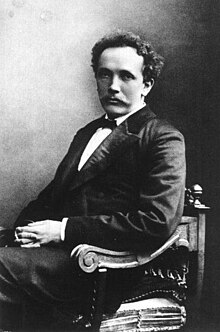
Tristan und Isolde, WWV 90, is a music drama in three acts by Richard Wagner set to a German libretto by the composer, loosely based on the medieval 12th-century romance Tristan and Iseult by Gottfried von Strassburg. First conceived in 1854, the music was composed between 1857 and 1859 and premiered at the Königliches Hoftheater und Nationaltheater in Munich on 10 June 1865 with Hans von Bülow conducting. While performed by opera companies, Wagner preferred the term Handlung for Tristan to distinguish its structure of continuous narrative flow as distinct from that of conventional opera at the time which was constructed of mundane recitatives punctuated by showpiece arias, which Wagner had come to regard with great disdain.

Richard Georg Strauss was a German composer and conductor best known for his tone poems and operas. Considered a leading composer of the late Romantic and early modern eras, he has been described as a successor of Richard Wagner and Franz Liszt. Along with Gustav Mahler, he represents the late flowering of German Romanticism, in which pioneering subtleties of orchestration are combined with an advanced harmonic style.

Bruno Walter was a German-born conductor, pianist, and composer. Born in Berlin, he escaped Nazi Germany in 1933, was naturalised as a French citizen in 1938, and settled in the United States in 1939. He worked closely with Gustav Mahler, whose music he helped to establish in the repertory, held major positions with the Leipzig Gewandhaus Orchestra, New York Philharmonic, Concertgebouw Orchestra, Salzburg Festival, Vienna State Opera, Bavarian State Opera, Staatsoper Unter den Linden and Deutsche Oper Berlin, among others, made recordings of historical and artistic significance, and is widely considered to be one of the great conductors of the 20th century.
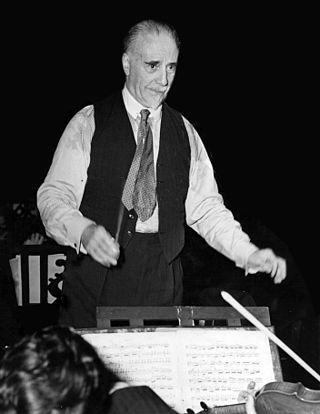
Sir Thomas Beecham, 2nd Baronet, was an English conductor and impresario best known for his association with the London Philharmonic and the Royal Philharmonic orchestras. He was also closely associated with the Liverpool Philharmonic and Hallé orchestras. From the early 20th century until his death, Beecham was a major influence on the musical life of Britain and, according to the BBC, was Britain's first international conductor.

Joseph Joachim Raff was a German-Swiss composer, pedagogue and pianist.

Franz Schreker was an Austrian composer, conductor, librettist, teacher and administrator. Primarily a composer of operas, Schreker developed a style characterized by aesthetic plurality, timbral experimentation, strategies of extended tonality and conception of total music theatre into the narrative of 20th-century music.
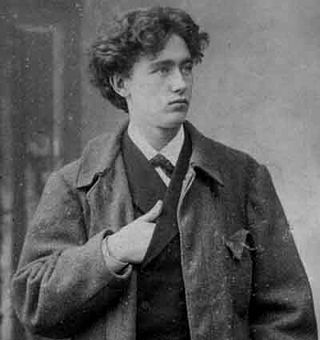
Paul Felix Weingartner, Edler von Münzberg was an Austrian conductor, composer and pianist.
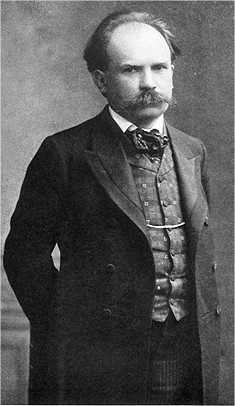
EugenFrancis Charles d'Albert was a Scottish-born pianist and composer who emigrated to Germany.

Kurt Böhme was a German bass.
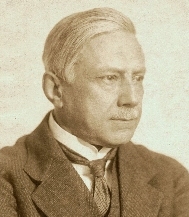
Emil Nikolaus Joseph, Freiherr von Reznicek was an Austrian composer of Romanian-Czech ancestry.

Joseph Charles Holbrooke, sometimes given as Josef Holbrooke, was an English composer, conductor, and pianist.

Siegmund von Hausegger was an Austrian composer and conductor.

Die Liebe der Danae is an opera in three acts by Richard Strauss to a February 1937 German libretto by Joseph Gregor, loosely based on a sketch written in 1920 in the style of Jacques Offenbach's satirical works, "Danae, or The Marriage of Convenience", by Hugo von Hofmannsthal. Strauss worked on the score in 1937, 1938 and into 1939, although he was pre-occupied with completing Daphne, developing ideas with Gregor and finally replacing him as librettist for Capriccio, and then succumbed to illness, which caused postponement for several months into 1940. The opera was finally finished on 28 June 1940.

Cornelis 'Kees' Dopper was a Dutch composer, conductor and teacher.

Jérusalem is a grand opera in four acts by Giuseppe Verdi. The libretto was to be an adaptation and partial translation of the composer's original 1843 Italian opera, I Lombardi alla prima crociata. It was the one opera which he regarded as the most suitable for being translated into French and, taking Eugène Scribe's advice, Verdi agreed that a French libretto was to be prepared by Alphonse Royer and Gustave Vaëz, who had written the libretto for Donizetti's most successful French opera, La favorite. The opera received its premiere performance at the Salle Le Peletier in Paris on 26 November 1847. The maiden production was designed by Paul Lormier (costumes), Charles Séchan, Jules Diéterle and Édouard Desplechin, and Charles-Antoine Cambon and Joseph Thierry.

Pauline Maria de Ahna, also known as Pauline Strauss, was a German operatic soprano and the wife of composer Richard Strauss. Her singing career was closely tied to her husband's career as a conductor and composer. From 1890 until 1894 she was committed to the Staatskapelle Weimar and from 1894 until 1897 she was committed to the Bavarian State Opera, during which times her husband was the principal conductor of those theaters. She also sang with her husband conducting at the Bayreuth Festival and in the world premiere of his first opera Guntram. Other houses at which performed included the Berlin State Opera, La Monnaie, and the Liceu. Her repertoire included leading roles in the operas of Beethoven, Humperdinck, Mozart, von Weber, and Wagner. After she gave birth to their son Franz Strauss in 1897 she retired from the opera stage. She thereafter continued to periodically perform in concerts of her husband's music, particularly Lieder. Strauss credited her as his muse for many of his compositions, including the title role in Salome, the Countess Madeleine in Capriccio, and the Four Last Songs among others.
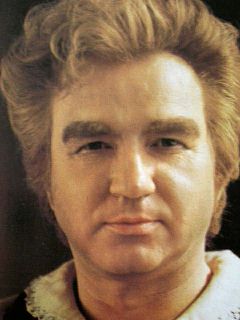
Reiner Goldberg was a German operatic heldentenor who made an international career performing and recording. He appeared at the Berlin State Opera from 1972, and was a member of the ensemble from 1981. Goldberg achieved attention when he sang the role of Wagner's Parsifal for a 1982 opera film directed by Hans-Jürgen Syberberg. He then became known for performing the tenor roles of Wagner's stage works in leading opera houses in Europe and worldwide, such as the Bayreuth Festival where he appeared from 1986 as Tannhäuser, Stolzing in Die Meistersinger von Nürnberg, Siegfried in both Siegfried and Götterdämmerung, and Erik in Der fliegende Holländer. He performed at the Metropolitan Opera as Siegfried, conducted by James Levine and alongside Hildegard Behrens as Brünnhilde, resulting in a recording that won a Grammy Award.

Wilhelm Schüchter was a German conductor. Between 1959 and 1962, he was the music director of the NHK Symphony Orchestra in Tokyo and is credited for raising its standards to an international level. He was Generalmusikdirektor in Dortmund from 1962 until his death. He opened the new opera house in 1966 with Der Rosenkavalier by Richard Strauss, and conducted the world premiere of the opera Eli by Walter Steffens after the drama of Nelly Sachs in 1967. He left a legacy of opera recordings, especially of excerpts sung in German.
Nicholas Laucella was an American concert flautist and composer. During the course of a professional musical career which spanned over three decades, he performed as the principal flute with several leading orchestral ensembles including the New York Philharmonic and the Metropolitan Opera Orchestra in New York City.
Irmelin is an opera in three acts with music by Frederick Delius. Composed between 1890 and 1892, it was his first opera, and was not premiered until 1953, nearly twenty years after his death. The libretto was by the composer, and weaves together folk-lore stories. In 1931 Delius made a new Irmelin prelude, using themes from the opera, and this has entered the concert and recording repertoire.
